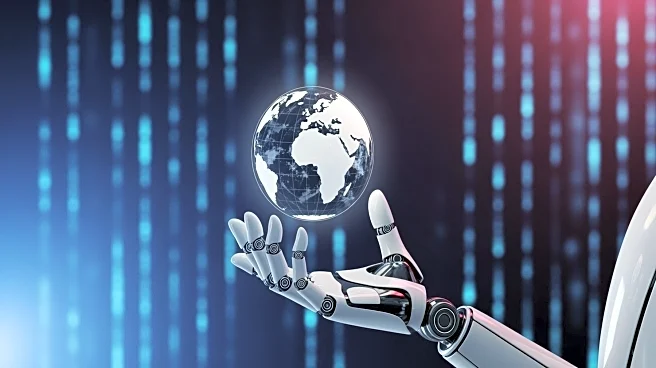What's Happening?
Prince Harry and Meghan, the Duchess of Sussex, have joined a diverse group of public figures in calling for a ban on the development of AI 'superintelligence.' This initiative is aimed at tech giants such as Google, OpenAI, and Meta Platforms, which
are actively pursuing AI technologies that could surpass human capabilities in various cognitive tasks. The call for prohibition is contingent upon achieving broad scientific consensus on safety and control measures, alongside strong public support. The letter highlights potential risks associated with AI superintelligence, including economic obsolescence, loss of civil liberties, and national security threats. Notable signatories include AI pioneers Yoshua Bengio and Geoffrey Hinton, as well as conservative commentators Steve Bannon and Glenn Beck, reflecting a wide-ranging concern across political and ideological lines.
Why It's Important?
The call to ban AI superintelligence development underscores significant concerns about the future impact of AI technologies on society. If unchecked, these technologies could lead to profound changes in employment, privacy, and security, potentially disempowering individuals and altering societal structures. The involvement of high-profile figures like Prince Harry and Meghan, alongside experts and political commentators, highlights the urgency and mainstream acceptance of these concerns. The debate over AI's role in society is crucial as it could influence regulatory policies and ethical standards in technology development, affecting industries reliant on AI advancements.
What's Next?
The letter is expected to spark further debate within the AI research community and among policymakers regarding the feasibility and implications of AI superintelligence. As discussions progress, stakeholders may push for legislative measures to ensure responsible AI development. The U.S. government could play a pivotal role in establishing guidelines and regulations to prevent a 'race to the bottom' in AI innovation, potentially leading to international cooperation on AI safety standards.
Beyond the Headlines
The ethical and cultural dimensions of AI superintelligence are profound, raising questions about human identity and autonomy in an increasingly automated world. The potential for AI to outperform humans in cognitive tasks challenges traditional notions of human superiority and could lead to shifts in societal values and norms. Long-term, this development may necessitate a reevaluation of human roles in the workforce and the ethical use of technology in daily life.














